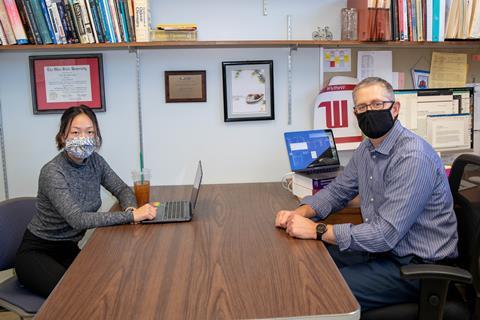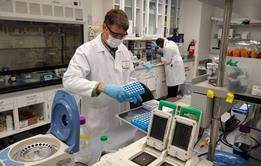An organic chemist in the US has used the pandemic to try to spark change in how chemistry is taught at universities

During this difficult time, Chemistry World will be checking in with notable chemists around the globe to see how they are weathering the coronavirus pandemic.
After Covid-19 forced Wittenberg University in Ohio, US to suddenly switch all of its courses online in mid-March, the chair of its chemistry department decided to use the opportunity to help his university and professors everywhere to navigate the new and more complex academic landscape.
Wittenberg’s chemistry department head of five years, Justin Houseknecht, worked with undergraduate biochemistry and molecular biology major Lucy Bates this summer to investigate how the transition to remote instruction affected learning in his 300-level Organic Chemistry 2 class. They found that the ability of these students to master course material did not change significantly after the transition to remote learning and assessment this past spring.
While his research over the past 15 years has primarily focused on computational chemistry, Houseknecht has become increasingly involved in chemical education research in recent years. In fact, he is on the leadership board of the Organic Education Resources (OrganicERs) community, which is an online group working to develop and disseminate more active learning methods for organic chemistry.
To carry out their research project, Bates – who will graduate from Wittenberg in 2022 – learned a statistical computing and graphics programming language called RStudio over the summer. ‘It was my first time coding,’ she says. Her analysis showed that remote collaborative learning worked surprisingly well, perhaps even better than face-to-face instruction. The biggest advantage seemed to be that teams were able to work at their own pace to solve the problems.
The equivalence of remote learning
The study examined the specifications grading system that Houseknecht used for this course, which involved identifying 26 discrete learning objectives that students were then quizzed on each week. Students who didn’t immediately master the material could retake the assessment until they demonstrated proficiency.
‘The frequency and being low stakes, really helped students to not feel the need to use resources they shouldn’t when taking the quizzes remotely, and it also gave them more frequent feedback about whether or not they are being successful,’ Houseknecht explains. ‘Plus, it gave us a lot of data to look at to see if there were changes in the students’ patterns of behaviour when we went remote.’
Examining the proportions of assessments that students passed when classes were in-person compared to online, there was an overall 98% mastery of the essential learning objectives in both scenarios. The students appeared to learn the organic chemistry skills remotely as well as they did in class. Moreover, there was no indication of increased cheating.
‘I was amazed, when Lucy started bringing me results, at how high a level of consistency there was between the face-to-face versus the remote assessment results,’ Houseknecht recalls. ‘They really had the same pattern of behaviour in terms of how many attempts it was taking them to pass their quizzes … which indicates that despite being remote they didn’t have additional resources they were using away from the classroom,’ he adds. ‘That was encouraging.’
Nevertheless, Houseknecht says this specifications grading system was significantly more difficult to manage remotely – the quiz retakes, for example, were much more time-consuming. Pre-pandemic, Houseknecht had up to six students retaking quizzes simultaneously, but now only one student can retake a quiz at a time. ‘My number of office hours tripled, which is a huge investment of time,’ he notes.
After Wittenberg’s courses went completely online in mid-March, the university reopened in August with a ‘Hyflex’ approach, which offers students three different learning scenarios. They can attend class live and in-person, live online, or watch a recording of the class asynchronously.
Navigating the HyFlex environment
‘I am continuing to try to figure out how to do collaborative learning in a “HyFlex” environment – it is extremely challenging,’ Houseknecht says. In the spring, when all students were remote, collaborative learning was fairly easy because he could put each group in a breakout room on Zoom to talk about how to solve problems, create a solution, and then post it to the course website. But now, students can be in any of the three learning situations at any time.
‘It has been very difficult to get communication between those three groups of students in a meaningful way – particularly because students can be switching between those three cohorts on a daily basis,’ Houseknecht says. ‘It has just been mind-boggling to try to make that work.’
Organic Chemistry 2 is a spring semester course, and in the current semester Houseknecht is teaching Organic Chemistry 1 and Nursing Chemistry for freshmen. Organic students are able to be in the lab, but only at 50% capacity. The class’s two lab sections are pretty small, with just 7 and 3 students. Typically, those numbers are between 15 and 20.
Bates is a teaching assistant (TA) for the university’s larger 100-level General Chemistry course. To help ensure social distancing, the decision was made to roughly double the amount of lab space and the number of TAs for the class, which currently has four sections.
Houseknecht is optimistic that Covid-19 and its fallout will help faculty to think about teaching and assessment more creatively. ‘Having had this disruption, and having to do things differently or failing at trying to do things the same, my hope is that it helps move us away from the traditional model of all lecture and just a couple of exams,’ Houseknecht says. ‘A lot more faculty are questioning what they have always done, and that’s the first step to doing something better.’
References
J B Houseknecht et al, J. Chem. Educ., 2020, DOI: 10.1021/acs.jchemed.0c00749
Chemists amid coronavirus

How chemists around the world are coping with life and work during the Covid-19 pandemic
- 1
- 2
- 3
- 4
- 5
- 6
- 7
- 8
- 9
- 10
- 11
- 12
- 13
- 14
- 15
- 16
- 17
- 18
- 19
- 20
- 21
- 22
- 23
- 24
- 25
- 26
- 27
- 28
- 29
- 30
- 31
- 32
- 33
- 34
- 35
- 36
- 37
- 38
- 39
 Currently
reading
Currently
reading
Chemists amid coronavirus: Justin Houseknecht



























































































No comments yet